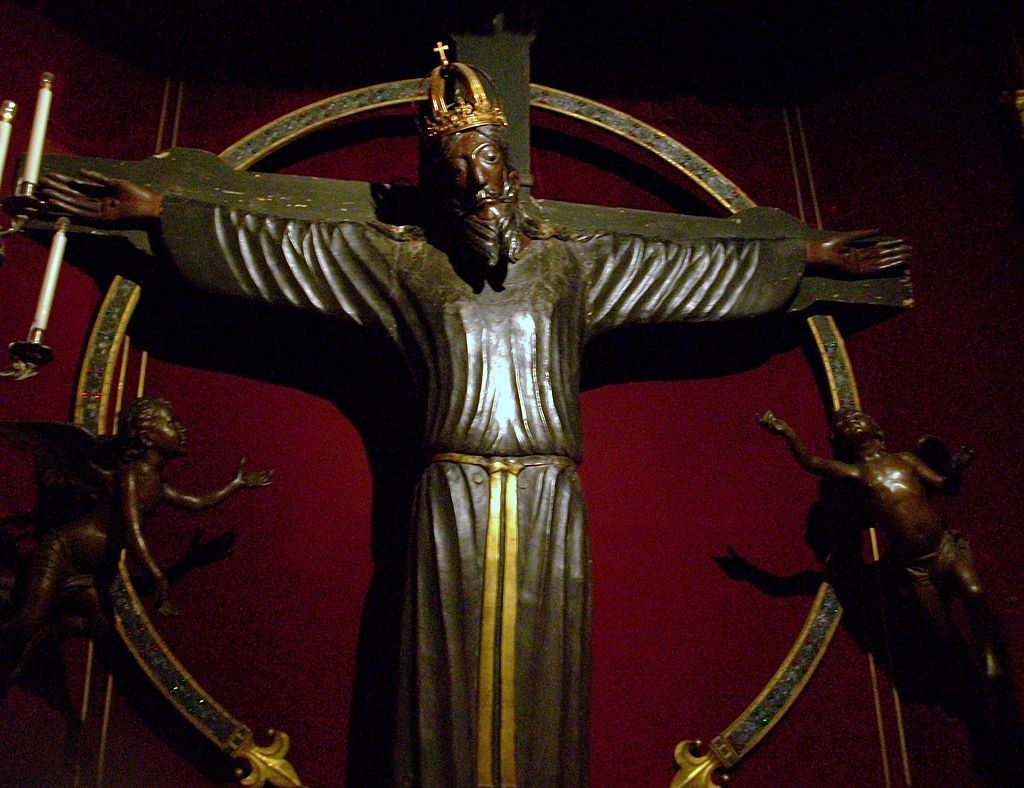93-year-old veteran Ivan J. Houston remembers the prejudice directed towards non-whites in the U.S. military during World War II. As an African-American, Houston was placed in a segregated infantry unit, and although at least 1 million African-Americans were enlisted in the military, his division was the only one allowed to join the combat in Europe.
The white commanders put Houston’s unit in charge of reclaiming the small city of Lucca, located in Tuscany, Italy. The soldiers were successful in liberating the city from the Nazis, later learning that the Italians of the city honored a historic statue of Jesus—and he was black.
“All I can say is that it’s amazing,” Houston told Angelus News about the discovery. On July 22, he was at St. Jerome Catholic Church in Westchester to give a lecture hosted by the African American Catholic Center for Evangelization (AACCFE).
In recent years he began to make annual pilgrimages to the “Black Christ of the Lucchesi,” also known as “Il Volto Santo” (“The Holy Face”). Nicodemus, one of the early followers of Christ, is believed to be the artist behind the large wooden image, although tradition says that after resting from his work, Nicodemus returned to find the face miraculously completed.
The trips to Italy have allowed Houston to keep in touch with the many Italians who remember his unit, Buffalo Soldiers, 92nd Infantry Division. He has also been back to Tuscany to film the war documentary “With One Hand Tied” and to research for his book, “Black Warriors: The Buffalo Soldiers of World War II.”
After the book’s publication, Houston discovered yet another connection between the Black Jesus and his regiment. On the cover of his book is a picture obtained from the national archives that shows Houston’s regiment moving along a rugged trail, which he realized was of a road called “Via Volto Santo.” This picture captures the beginning of the battle that allowed the African American soldiers to win the war in Italy.

“That action that we took, moving along that trail, closed the pass, keeping the Germans from escaping into the valley, forcing more than 10,000 to surrender, and ending the war in Italy,” said Houston. “That was amazing. Our first battle led to the liberation of the city of Lucca and it’s Cathedral with Il Volto Santo. Our last battle saw us moving into action along a trail called the Via Volto Santo.”
Although the Italians still celebrate the valor of the Buffalo soldiers, giving them the nickname “the good giants” and performing reenactments in their honor, the soldiers’ homecoming after World War II was difficult. “When we returned home, there was no acclaim. We were fighting for first class citizenship,” he says. “Well, that didn’t come about then.”
AACCFE director, Anderson F. Shaw, says these monthly lectures aim to “enrich folk about their own history and not only about what is happening in African-American culture but what is happening in the Church at large.” He adds, “As a director, I’m looking for something that our people can grow from. I wanted to share that with the rest of the community.”
The Center, which just celebrated its 20th anniversary, is responsible for hosting the annual Black History Month Liturgy at Our Lady of the Angels Cathedral. “We tend to be a people that are part of a larger church but not very visible,” Shaw says. “So what we do is promote visibility, we promote voice, and then we also promote the vibrancy of our faith.”
Shaw is often asked how Black History Month relates to the Church. He says, “If you look back [to the Acts of the Apostles] the Ethiopian was actually baptized before St. Paul was. Blackness has been a part of this Church from the very beginning.”
Correcting the “false, Eurocentric” interpretation of the Bible is important, says Terry Dicks, who holds a Masters from the Jesuit School of Theology. Dicks gave a presentation about the Black African presence in the Bible.
Although, Dicks was able to provide a long list of the many notable Africans in the Bible, she notes that the Bible’s vagueness when describing race shows: “God is not interested in skin color.” She adds, “God doesn’t consider outward appearances. He cares about the heart.”
She points to the story of the three magi, which she says serves to represent the three known continents of that time. Quoting Scripture, she says, “He says, ‘I will draw everyone to myself.’ So, that’s the important point: to know that we are all included.”
Shaw invites everyone to these meetings, regardless of race. Inclusion is important, he says. “You can’t continually talk about being excluded, unless you are trying to bring people in with you. So, we are trying to switch that around and say, ‘Come be with us.’”
Start your day with Always Forward, our award-winning e-newsletter. Get this smart, handpicked selection of the day’s top news, analysis and opinion, delivered to your inbox. Sign up absolutely free today!

